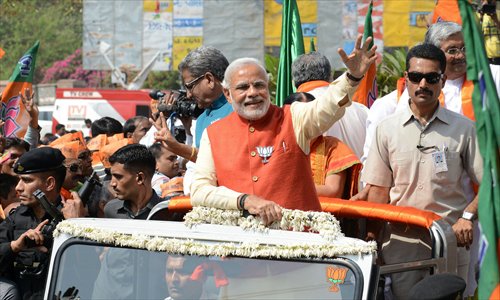Indian elections underway

Gujarat state Chief Minister and Bharatiya Janata Party's prime ministerial candidate, Narendra Modi greets supporters in Vadodara, some 110 kilometers from Ahmedabad on Wednesday prior to filing his nomination papers for the elections. Photo: AFP
In India, the country's nearly 815 million voters started voting from Monday in a month long poll to elect a new government that will among its many challenges have to mend a sluggish economic rate.
The election in the world's largest democracy comes amid global economic weaknesses that have also contributed to India's longest period of below-5 percent growth since the 1980s.
More than half of India's 1.22 billion population is aged under 25 - a huge youth bulge that poses a major challenge to a country struggling with jobs. It is estimated that some 200 million people will be entering the job market over the next two decades.
Besides the job problem, there are other issues for the next government to struggle with, which include spine breaking inflation, currently running just over 8 percent.
Rising food prices are one of the major issues at the center of the polls in a country where, according to the government's own estimates, 270 million people still live in poverty, despite the fact that huge gains have been made before the economy started a downward trajectory in 2011.
That is the primary reason why the economy is at the center stage of the elections.
The vote is surely the world's largest, with nearly 815 million eligible voters set to choose 543 members of the Lok Sabha, the lower house of parliament. There will be at least 930,000 polling stations across India for the phased election from April 7 to May 12.
A whopping 1.7 million electronic voting machines will be used to cast votes, with administrative costs expected to exceed $645 million.
V. S. Sampath, the chief election commissioner, told the Global Times in Delhi that all arrangements have been put in place to ensure the polling is free and fair.
"That is the beauty of this largest democratic exercise … they are free and fair, peaceful and participative and are the lifeline of democracy," Sampath said.
Votes will be counted by the Election Commission of India on May 16. The results are expected to be announced that day, which means a new government will be in place by the third week of May.
"The economy is a major issue for many Indians, and the slowing GDP growth rates have led many analysts to conclude that the dominant [ruling] Congress party is doomed, probably in favor of the opposition BJP [Bharatiya Janata Party]," said leading US pollster Gallup on Friday.
Economic pessimism
The organization noted that a perceived "growing pessimism about the economy is likely" to be a warning for the long-governing Congress.
The US survey, based on face-to-face interviews with 3,000 adults, aged 15 and older, was conducted in September and October 2013. It is in line with most predictions suggesting that the center-right BJP-led coalition is likely to get a majority or a number close to a majority in the lower house.
Generally there is a feeling of frustration over the Congress-led United Progressive Alliance government handling of the economy and a number of alleged corruption scandals.
The BJP with its prime ministerial candidate Narendra Modi - a staunch Hindu fundamentalist - has a cleaner image.
The BJP are likely to benefit from an anti-incumbency backlash but have also made their focus clear on urbanization, infrastructure and clearing excessive bureaucratic hurdles to win back investor confidence.
Congress, under the leadership of Rahul Gandhi, a scion of India's first political family, the Nehru Gandhi's, has pledged to promote inclusive growth by a host of welfare schemes, including a right to healthcare for all and pensions for the aged and disabled.
Desperate wooing
The parties in their desperate bids to woo young voters, who are considered to be the deciding factor for the election, have been gung-ho about their claims and promises in full page newspaper advertisements and TV commercial spots.
However, the venality of Indian politics has cast a shadow over the polls while increased involvement of Indian politicians in widespread corruption has dented the confidence of India's growing middle class.
While Congress suffers due to the alleged corruption, the BJP is also struggling to clear its image, and that of poster boy Modi, for rampant religious riots against Muslims in Gujarat in 2002.
The communal violence in Gujarat, ruled by Modi, left at least 1,000 people dead after Hindu mobs rioted following nearly 60 Hindu pilgrims being burnt to death on a train. Modi has been linked to the riots by allegedly allowing or abetting the anti-Muslim pogrom.
"Modi surely has an edge but he carries with himself a baggage of being communal and that too with a violent tag. It is not going to be a cakewalk for him to win the elections for his party," Ranjan Misra, a political science teacher, at Delhi University, told the Global Times.
Opinion polls also suggest that even if Modi has an edge, no party is likely to get an outright majority in parliament.
A total of 272 seats are needed to elect a prime minister. And in case of a fractured verdict, which is most likely, regional parties will probably be needed to get a majority to form the government in New Delhi.
And that will be a repeat of what the Congress government looked like: A hodgepodge of multiple political forces, pushing the government towards their own interests at the cost of the overall national interest.
But it is also true that elections in India - with a huge number of voters in a sprawling democracy - are difficult to predict. And surveys are not always reliable. The actual winner is anybody's guess.